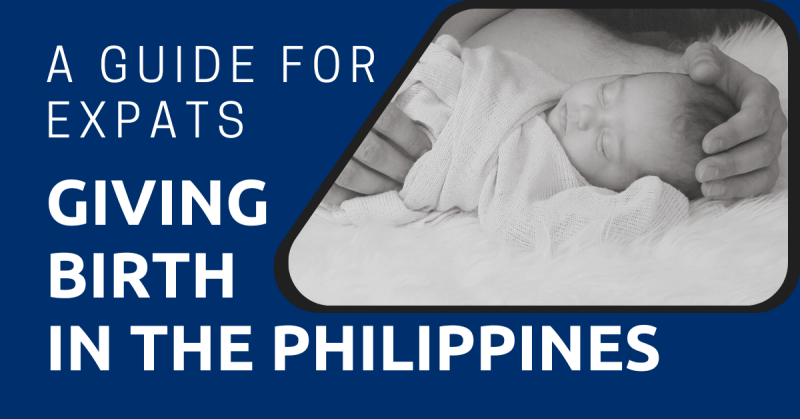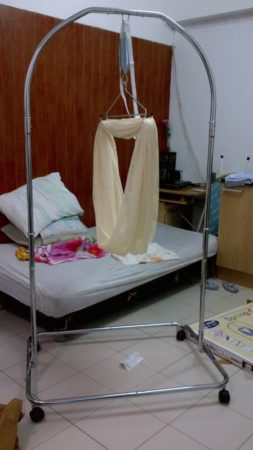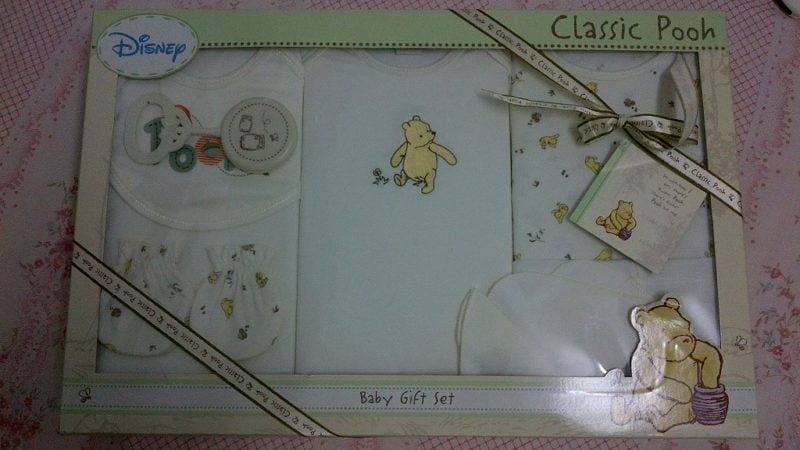
While pregnancy and birth should be joyful and exciting events, childbirth and becoming a parent can also be worrying and intimidating experiences.
Challenges during childbirth and pregnancy will inevitably be exacerbated in a foreign country, and the Philippines is no exception. So to make this life-changing event easier for you we have made this article for future expat moms and dads so that you know what to expect giving birth in this beautiful country.
This article will take approximately 27 minutes to read. Don't have the time right now? No worries. You can email the ad-free version of the article to yourself and read it later!
Disclaimer: This article may include links to products or services offered by ExpatDen’s partners, which give us commissions when you click on them. Although this may influence how they appear in the text, we only recommend solutions that we would use in your situation. Read more in our Advertising Disclosure.
Contents
- Learning You are Pregnant
- Things to Prepare Before Giving Birth
- Public or Private Hospital?
- Popular Hospitals
- Finding an Ob-Gyne
- Prenatal Care
- Natural vs Caesarean Birth
- Is Home Birth an Option?
- Finding a Doula
- Birth Plans
- Preparing for the Delivery
- After the Delivery
- Costs
- Maternity and Paternity Leave
- Filipino Traditional Practices and Superstitions
- Now, On to You
Learning You are Pregnant
First things first, what to do if you think (or hope!) that you are pregnant? You buy yourself or your loved one a pregnancy test kit, of course. These are widely available at drug stores like Watsons and Mercury Drug and are not expensive, costing ₱100-150 (around US$2) for two tests. If you have time to wait you can even order them directly from Lazada or Shopee!
If the test indicates that you are pregnant, you will need to confirm the result with a gynecologist. This can be done at either a private clinic or a hospital in your area with a maternity department. You will have to pay approx ₱500-700 (around US$9-13) for the scan to determine if you are pregnant.
Things to Prepare Before Giving Birth
To help you prepare for the baby, here are a couple of things to do before you give birth that will help you savor those special moments with your newborn.
Look Into Private Insurance or PhilHealth
Since 2017, it has been possible for Foreign Nationals under the Rules and Regulations of RA Protected content, as amended by RA Protected content, to be included in the National Health Insurance Program (PhilHealth) providing that you have either chosen to retire in the Philippines, are a former Filipino citizen, or have either a working visa or marriage visa.
You can check whether you are eligible to be included in Philhealth by either asking your employer or contacting the National Health Insurance Program directly at their call center which is open 24/7.
Total coverage for normal deliveries in PhilHealth accredited hospitals and accredited non-hospital facilities is only ₱6,500 (approx US$118). This is broken down into three parts:
- ₱3,000 (around US$54) for the medical facility,
- ₱2,500 (around US$45) for the professional fee,
- and ₱1,000 (around US$18) for prenatal care.
PhilHealth covers mothers who give birth via C-section with a fixed amount of ₱19,000 (approx US$344). This is divided into two parts:
- ₱11,400 (around US$206) for hospital and medical fees
- and ₱7,600 (around US$138) for doctors’ fees.
However, most expats have private health insurance that should be able to cover the full cost of the pregnancy making the pre- and postnatal experiences stress-free bliss. The cost and coverage of these private insurance plans vary from provider to provider and depend on your overall health as well.
Take Some Time for Yourself
When the baby comes, your newborn will take all your time and will be the center of attention. Taking time for yourself, both alone and with your partner, is important. When the baby comes, you and your partner will love your newborn in an all-consuming way and won’t have time for yourself for the foreseeable future.
Public or Private Hospital?
After finding out you are pregnant, one of the most important decisions during your pregnancy will be to choose the hospital for your prenatal checkups and where you will eventually give birth.
Public hospitals are often subpar compared to Western Hospitals or many other countries in Asia. Therefore it would be advised to give birth at a private hospital.
Private hospitals in the Philippines will mostly offer the same experience that you would expect in your home country. Facilities and equipment are as good as you will find anywhere in the world, which is not the case with public hospitals.
Private hospitals offer maternity packages in different price ranges — it’s basically up to you to decide how much luxury you want or can afford.
Do you prefer to give birth in a deluxe private room in one of the best private hospitals in Manila? Then you should expect to pay somewhere between ₱150,000 to ₱300,000 (around US$ 2,713 to US$ 5,426).
This can be done cheaper if you want to give birth in a midrange private hospital in Manila that offers a shared room for approx. ₱150,000 (around US$ 2,713) for a maternity package which includes a natural delivery and 2-3 days of hospital stay after the birth.
Popular Hospitals
If you have decided to give birth and get prenatal care at a private hospital then the next question arises. Which hospital should you choose? Some private hospitals have a better reputation than others, and it might be worth taking your time to visit a couple of hospitals before deciding which one should you go to on the big B-day.
Metro Manila

The Medical City
Ortigas Avenue, Pasig City, Metro Manila, Philippines
Phone: +63 2 8988-1000
The Medical City is a private hospital running since 2003 and includes specializations like Orthopedics, Neurology, Cardiology, Pediatrics, and OB-GYN. The professional staff at the Medical City are well educated, speak English, and have access to equipment and facilities as good as you will find anywhere in the world.

St Lukes Hospital Philippines Medical Center
32nd St. Bonifacio Global City Taguig City, Philippines
Phone: +63 8 789-7700
St Luke’s Medical Center is well known in the expat community in Manila and has been providing world-class health care since 1982. The hospital has some of the best physicians, staff, and facilities in the country. Therefore, you are in safe hands if you decide to give birth at this hospital.

Makati Medical Center
2 Amorsolo Street, Legaspi Village, Makati, Metro Manila
Phone: +63 (02) 8888 8999
Makati Medical is known throughout the country as one of the best places to receive treatment and give birth for both domestic and foreign patients. The hospital received an “A Decade of Achievement ” special award from Asian Hospital Management (AHMA).

Asian Hospital and Medical Centre
2205 Civic Dr, Alabang, Muntinlupa 1780
Phone: +632 8-771-9000
The Asian Hospital and Medical (AHMC) is the first hospital in the Philippines that has an ambiance comparable to a luxury hotel. The hospital is accredited by HCI and was established in 2002 with the goal to provide holistic health treatment that involves comfort and healing making it one of the best hospitals in the country for giving birth and OB-Gyne consultations.
Cebu City
While Expats in Metro Manila have better options for healthcare, expats in Cebu often claim that the two following hospitals in Cebu City are the best, whether it’s for childbirth or any other health-related matter.

Chong Hua Hospital
Don Mariano Cui Street, Fuente Osmeña, Cebu City 6000
Phone: +6332 255-8000
Chong Hua Hospital in Cebu City is the first hospital outside of Metro Manila that was accredited by JCI, which is telling for the type of professionalism and healthcare you can expect if you choose to get prenatal care or give childbirth here.

Cebu Doctors’ University Hospital
Osmeña Blvd., Cebu City
Phone: +6332 255-5555
In addition to being a healthcare provider, Cebu Doctors University Hospital also serves as an educational institution and provides a safe environment to give birth and for prenatal care.
Davao City
Davao City is a major city in the southern region of Mindanao, and while the offers for private health care aren’t on par with what you can find in either Manila or Cebu City, you still have a couple of options for your prenatal care and eventually childbirth.

Davao Doctors Hospital
118 E. Quirino Avenue, Davao City 8000
Phone: +6382 222-8000
Davao Doctors Hospital was founded in 1969 and has since become the largest and most modern hospital in Southern Philippines. If you are living in this area of the country and want world-class treatment during prenatal care and childbirth, this is the hospital for you.
Finding an Ob-Gyne
In the Philippines, the cost of an Ob-Gyne visit can vary depending on the type of healthcare facility. If you prefer an upscale clinic, you should expect to pay approx. ₱1,500-2,000 (around US$27-36) for every visit. Midrange clinics can cost around ₱700-1,000 (around US$13-18) for monthly checkups.
For expats, an OB-Gyne at a private hospital might be the best option since they will have all the necessary equipment readily available to check if your pregnancy is progressing as scheduled. And if any unexpected problems occur, you can easily be admitted to the hospital for private care.
Finding an OB-Gyne in either Manila, Davao, or Cebu is straightforward. Just visit the local private hospital or Google OB-Gyne clinics in your area and look at the reviews. After this, you can visit the clinic of your choice and get a checkup.
Something you might consider would be getting recommendations from friends, family, or neighbors. Have they used an OB-Gyne that they trust? Then it might be worth using that specific clinic.
Prenatal Care
Prenatal services in the Philippines will be similar to those you receive in your home country. After you have confirmed that you are pregnant, you will be given a ‘baby book’ to record your baby’s development, and have regular checkups monthly and more frequently as the due date approaches.
An ultrasound scan at 22 weeks is standard and can be an exciting experience as you get to know your baby’s gender for the first time.
However, since abortion is illegal in the Philippines, you will not get the option to end your pregnancy if the OB-Gyne determines something is wrong with the baby. The only way to get an abortion is to travel to neighboring countries like Thailand or Vietnam or go back to your home country if abortion is legal there.
As an expectant parent who never has welcomed a newborn into the world, it’s quite normal to have a lot of concerns and questions. Your preferred OB-Gyne will answer your questions and put your mind at ease.
And if you prefer, you can sign up for childbirth preparation courses that most private hospitals offer.
Otherwise, you can find a private provider of preparation courses for expecting parents. Conscious Birth Manila is often hailed as one of the best providers in the country. Here you can get answers to all of the questions that you might have as an expectant parent.
Online resources can be a great help as well, although you should be sure to use trusted resources such as Parentune.com. But keep in mind, not all information is accurate or helpful, and it can cause expectant mothers and fathers unnecessary worry reading about all the possible things that could potentially go wrong during pregnancy and childbirth.
Natural vs Caesarean Birth
In a public hospital in the Philippines, the doctor will decide whether the birth should be vaginal (natural) or a C-section. You can’t make this decision yourself and will have to comply with the doctor’s professional decision.
Therefore, if you want or prefer a Cesarean birth, you should choose a private hospital where you can choose to welcome your baby to the world naturally or with a C-section.
The cost for a vaginal birth without any complications in a private hospital ranges from ₱100,000 to ₱209,000 (around US$1,812 to US$3,789) depending on your preferred hospital. However, keep in mind that the cost of a C-section will be almost double compared to a natural birth since you need more days to recover and more doctors and nurses are often required.
Is Home Birth an Option?
The Philippines has had a “no home birth” policy since 2018 to reduce the high maternal mortality rate. However, home birth has been common practice in the Philippines for years to save money since childbirth is expensive even in a public hospital where the cost of birth can be up to ₱45,000 (around US$816).
Considering that the average monthly salary in the Philippines is ₱25,000, this policy has resulted in many women still giving birth at home but eventually being fined after coming to a hospital to register the newborn baby.
With the relatively new policy in mind, it’s therefore not advised to give birth at home, even if you find a professional doula and medical staff to assist you during childbirth.
Finding a Doula
A doula is quite common in the Phillippines, especially if you are a new parent that is uncertain about what to expect about giving birth or becoming a parent.
A doula is professionally trained to guide you throughout the pregnancy and will give you practical, emotional, and physical support when needed.
While you might be hesitant to choose to get help from a doula during your pregnancy, evidence shows that it has several benefits. Some studies have shown that having a doula as a member of the birth team decreases the overall Cesarean rate by 50%, the length of the labor by 25%, and requests for an epidural by 60%.
If you prefer a professionally trained doula you could try and give Pinay Doulas Collective a call. They can assist you with maternity support — whether it’s fertility, pregnancy, labor and delivery, postpartum, or breastfeeding.
Otherwise, it’s quite normal getting help from an experienced woman who has tried giving birth before.
Birth Plans
Most expecting mothers like to have a birth plan in writing. This plan will typically detail in which hospital you want to give birth, what sort of medication for pain relief you want, who you want to be present at the big B-day, and what you expect from them.
However, as any parents who have been welcoming a new baby into life will tell you, plan for the worst and hope for the best, which is particularly true in the Philippines.
So plan well ahead and be prepared to be flexible. Everyone who has been living in the Philippines knows that not everything goes according to plan, so don’t stick to your birth plan if it is no longer helpful or relevant.
Preparing for the Delivery
It’s normal to be nervous before the delivery, but there are some easy steps you can take a couple of months before the baby comes to make the transition even easier.
Prepare All the Baby Gear
Before the baby arrives you should have already purchased, assembled, and tested certain items to ensure that they work and that you know how to use them.
Expecting parents have a tendency to purchase more than needed. But when it comes to baby gear, less is more. Make sure to buy the essentials like a crib, stroller, baby clothes and diapers for the first couple of months, and a bassinet.

Join Supportive Mother Groups
Becoming a parent can be a daunting experience, especially if it’s your first time.
Momcenter.com.ph is a great source for online support, or you can consider joining Facebook Groups such as Breastfeeding Pinays, Babywearing Philippines, or Glam-0-Mama’s where mothers are helping each other in becoming the best parent they can become.
Sign Up for Parenting Classes
Parenting classes can be beneficial for first-time parents. You can get information about these classes from friends, neighbors, family OB/GYN, doula, or at the hospital where you plan to have your baby.
Look for a Pediatrician
Start looking for a pediatrician about 3 months before your due date. Compile a list of candidates and ask for recommendations from friends, family, neighbors, your doula, OB-Gyne, or coworkers with kids.
If possible, schedule a pediatrician consultation before your due date to make sure that your preferred choice can assist you when needed after the delivery.
Prepare Documents
When you are admitted to the hospital, you or your companion will be asked to fill out a form detailing information about you, including place of birth, date of birth, allergies etc., which you might have forgotten or your partner may not know.
Make sure to write all this down on a piece of paper before your delivery date to make it easier for you and your partner to fill out the form.
Moreover, marriage certificates, government IDs, health insurance, and PhilHealth cards are equally important to bring to the hospital during your delivery. This way you don’t have to send your partner home to pick these up while you are recovering after childbirth.
Pack a Mommy Bag
Pack a suitcase or backpack for the hospital well in advance. Remember to take along:
- Nightgown and slippers
- Toiletries, including toothbrush and hairbrush
- Clothes for your return home: choose comfortable clothes you wore mid-pregnancy or later
- Baby clothes like an undershirt or one-piece suit for the trip home from the hospital
- Swaddle
- Baby wipes
- Maternity pads
- Camera/video camera or the charger for your smartphone
- Nursing bra and nursing pads for breastfeeding moms
Make and Freeze Meals
If you don’t have access to Grab or FoodPanda deliveries in the first couple of weeks after giving birth, consider pre-making and freezing meals. You might be lucky to have good friends or family that can bring you food while meeting the baby, but you can’t always rely on that.
Make Provisions for Your Pets
It’s essential to ensure that things are in order for your pet so it gets the proper care when the baby comes. Stock up on pet food, treats, toys, and any medication. If necessary, arrange for someone to stay with your pet while you are in the hospital.
And if you are worried that your pet will suffer from lack of attention, you can ask a friend or family member to take care of the pet for a while after giving birth.
Install the Car Seat
If you are a car owner, make sure that your baby’s car seat has been installed properly before you go to the hospital. If you need to rely on either taxi or Grab on the day of delivery, then make sure to bring a baby capsule with you.
After the Delivery
Public hospitals will generally want to discharge you as soon as possible, so if your delivery went as expected, you will be home either the same day or the day after.
When getting a maternity package at a private hospital, you can expect that three to four days of admission is included in the cost.
Suppose your newborn child is premature or experiences difficulties. In that case, this can be frightening, but stay positive and prepare enough money in the bank to pay for unexpected costs, since the extra treatment and care will cost you extra.
At a private hospital, neonatal care is on par with what you can expect in your home country, and the outcomes for prematurely born babies are usually good.
Birth Certificate
If your delivery goes as expected, the medical personnel at the hospital will make you fill out the form for the birth certificate. This is the most important document for your baby, as every newborn in the Phillippines must be registered at the Local Civil Registry, regardless of whether your baby is entitled to dual citizenship or not.
You can secure a copy of the birth certificate from your local barangay office and have it certified by the National Statistics Office (NSO).
Citizenship
If either you or your partner is a Filipino citizen, your newborn baby will be eligible to become a Filipino citizen by birth according to the Constitution of the Republic of the Philippines 1987, no matter where in the world you gave birth.
In this case, it’s worth also checking if your child is eligible to become a dual citizen. 49 of all countries allow dual citizenship: The US, Caribbean States, Turkey, Spain, Denmark, Poland, Philippines, Taiwan, Thailand, and many more. So if you decide that your newborn should get dual citizenship you need to check your local immigration laws.
If you are an expat couple and none of you are Filipino citizens, then your baby is not eligible for either a Filipino passport or citizenship. In this case, you need to contact your local embassy or consulate in the Philippines which can assist you to register your child as a citizen in your home country.
Breastfeeding
The Philippines has a relatively low percentage of exclusively breastfed babies: approx. 34% of children, compared to a global average of 43%.
This has nothing to do with superstition or tradition but is largely attributed to the aggressive marketing of infant formula by big businesses, mothers not being able to afford to take maternity leave, and malnutrition in mothers.
According to WHO, breastfeeding is one of the most effective ways to ensure child health and survival since breast milk is safe, clean, and contains antibodies that help protect against many common childhood illnesses. Moreover, breast milk provides all the energy and nutrients that the baby needs for at least the first 6 months of life.
Breastfeeding should start as soon as possible after the delivery, and the nurses at the hospital can give you the proper assistance and help if this is a new experience for you. If you choose to breastfeed but struggle to produce enough milk, then a doula or your doctor can support you as well.
Going Home
After recovering at the hospital for a couple of days, it’s time to go home. Take a taxi, your car, or order a Grab car and make sure to bring an infant car seat so that your baby is safe on the trip home.
It can be an overwhelming experience becoming a parent, especially if it’s the first time. So don’t feel ashamed to ask for help from your family or friends if needed, and consider getting a helper/yaya to come and help with cleaning a couple of times a week.

Start Babyproofing
While it’s not 100% necessary to do this before the baby gets older and mobile, it doesn’t hurt to get ideas and make lists of things you need to baby-proof your home.
While there are different approaches and how much baby proofing is needed, the bare minimum would be to cover all sharp furniture edges and corners with some kind of safety padding or bumpers and latch closed any doors or drawers within reach of the baby.
Post-Partum Care
The period after childbirth is a joyous time, but it’s also a period of adjustment and healing for new mothers and fathers. It takes some time to adjust to parenthood, and it’s important to get plenty of rest, eat healthy meals, exercise, and seek help from family and friends if needed.
Moreover, you need to look for signs of postpartum depression, which most commonly occurs within 6 weeks after childbirth. Postpartum depression occurs in about 7-20% of all women. You should seek professional help if you are experiencing the symptoms below after childbirth, since if left untreated, postpartum depression may last for many months or longer.
- Depressed mood or severe mood swings
- Crying too much
- Difficulty bonding with your baby
- Withdrawing from family and friends
- Loss of appetite or eating much more than usual
- Insomnia or sleeping too much
- Overwhelming tiredness or loss of energy
- Less interest and pleasure in activities you used to enjoy
- Intense irritability and anger
- Fear that you’re not a good mother
- Hopelessness
- Feelings of worthlessness, shame, guilt, or inadequacy
- Reduced ability to think clearly, concentrate or make decisions
- Restlessness
- Severe anxiety and panic attacks
- Thoughts of harming yourself or your baby
- Recurring thoughts of death or suicide
Costs
The cost of medical services in the Philippines is significantly lower than in the US and many other places around the world.
However, if you come from a country with free healthcare such as Denmark, Sweden, or the UK, you may be shocked when you get the final bill after the delivery of your newborn child.
Public hospital: Approx. ₱300-400 (around US$5-7) for prenatal and routine checkups and another ₱40,000-50,000 (around US$725-906) for the natural delivery. The price of a C-section is around ₱80,000-100,000 (around US$1,457-1,822).
Private hospital: ₱700-1,000 (around US$13-18) for prenatal and routine checkups at your preferred OB-Gyne. Expect to pay upwards of ₱150,000 (around US$2,719) for a natural delivery and as much as ₱350,000 (around US$6,345) for a C-section.
Maternity and Paternity Leave
As a new mom, you are entitled to receive up to 18 weeks of maternity leave, inclusive of the statutory pre-natal period that should be used within 12 months from the date of birth. The maternity leave is with full pay and an option to extend for an additional 30 days without pay.
New fathers, on the other hand, have a right to seven days of paid paternity leave. However, you may have the right to extended paternity leave with your employer.
Filipino Traditional Practices and Superstitions
While you can expect the birth of your baby to take place in the same way as in your home country, the Philippines has some very special beliefs and superstitions during pregnancy and childbirth. It’s mainly old superstitions and not something that is rooted in science.
Nevertheless, it’s important to know the local customs and traditions to prepare yourself for the potential culture shock as a new parent in the Philippines.
Don’t look at ‘ugly’ people while pregnant
According to Pinoy superstition looking at ‘ugly’ people during your pregnancy will lead to you giving birth to an ‘ugly’ child.
On the flip side, this superstition also states that looking at ‘beautiful’ people will make your child ‘beautiful’.
Don’t take a bath for a week after you give birth
Giving birth is hard, sweaty, and bloody, and unfathomable fluids and bits come out of you. However, some elders believe in this myth because they think a shower shortly after delivery may cause a “bit” or relapse from their recovery.
And while it might sound quirky, it’s something new mothers adhere to and one that medical experts strongly and frequently disprove. So, do get some rest after giving birth; but take a shower when you can — for your and everyone else’s sake.
If a child has two hair whorls, he or she will be hyperactive
While having two hair whorls is a genetic predisposition, no scientific evidence states that this unique feature leads to naughtiness or hyperactivity.
Strangers should wipe saliva on a baby’s tummy
According to Filipino superstition, babies are more susceptible to becoming sick if a stranger says hello to them. Even after stating how cute a baby is, the stranger needs to wipe saliva on the baby’s tummy to prevent the baby from getting sick.
Now, On to You
It can seem intimidating to give birth in a foreign country like the Phillippines, and you might feel that you want to fly home to your home country to be closer to your family and friends and potentially avail of free healthcare. However, many expat moms have given birth in the Philippines, and many spouses with Filipina wives have become parents in this beautiful island nation.
And for the vast majority, it’s a positive experience without any hiccups. Whatever you decide to do, I hope that the pregnancy, birth, and eventual parenthood will be a happy event!
Please note: The information provided by ExpatDen is not intended to replace or serve as a substitute for medical or healthcare advice. It is strongly recommended that you seek guidance and consultation from a licensed medical practitioner or qualified healthcare professional pertaining to your specific circumstances and healthcare needs.







